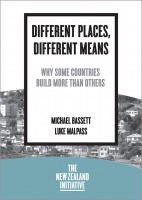Different Places, Different Means
Think that New Zealand is the only nation that faces house price inflation? Well we are not, but we are in a club of mostly Anglosphere nations that experience rabid house price inflation. Read more

You searched everything for "" and got 542 results
Think that New Zealand is the only nation that faces house price inflation? Well we are not, but we are in a club of mostly Anglosphere nations that experience rabid house price inflation. Read more

This report is a summary of fieldwork abroad on how different jurisdictions deal with their housing markets, and the interaction between regulation, local government and building. Key points Switzerland and Germany have remarkably stable prices compared to New Zealand, while Texas has had stable and low house prices for an extended period. Read more
Wellington (12 September 2013): Would-be home owners don’t have to resign themselves to ever increasing house prices according to the latest research from the New Zealand Initiative, which found three overseas markets who are getting it right. In brief, the research found: In Germany and Switzerland, where the right to build is entrenched and local government funding is linked to population growth, house prices were stable but high; In Texas, where projects outside of zoned municipal areas are run by private developers, house prices had been maintained at a low level for an extended period; and Britain’s planning system, which shares many attributes with New Zealand, has delivered housing shortages, steep house price inflation, and smaller, more urban dwellings. Read more
Rightly or wrongly, Britain and its former Antipodean colonies are obsessed with property – it’s imperative that you get that critical first step on the housing ladder. Given this level of obsession, it’s easy to see why housing has become a political football in all three countries, with politicians regularly trotting out new policies to help people buy a first home. Read more
At the National Party conference last weekend there were a number of announcements around housing; some were helpful, and some were less helpful. The well-reported aspects of the housing announcement have been an increase in the availability of Kiwisaver subsidies and the expansion of ‘Welcome Home’ loans. Read more
Ever since the creation of the Auckland super city, murmurings have surfaced in Wellington about a greater Wellington council to include the Hutt Valley, Wairarapa and Kapiti. Intuitively, large councils seem undesirable; why take local governance further away from locals? Read more
On 25 July, a Dominion Post article (Consent proposals upset rural residents) asserted that, under a proposed district plan, rural landowners might face new requirements if their property includes dominant dune ridge lines, outstanding landscapes, amenity landscapes or ecological and geological sites. Owners in possession of such land may now require a resource consent to work on farm fences, culverts and farm tracks. Read more
Throughout most of human history, cities were the dominant force of political affairs. From the very first cities of Mesopotamia in the seventh millennium BC, to Athens and Rome, and the city states of the Middle Ages, cities drove the development of political affairs, of culture, of democracy, of finance, of the arts, of education. Read more
The New Zealand Herald ran two contributions on the housing affordability debate this week. The first was by the Bank of New Zealand’s Tony Alexander advocating the restriction of foreign investment in housing. Read more
If someone asked you how much of New Zealand was built upon, what would your guess be? 5% or 10%? Read more